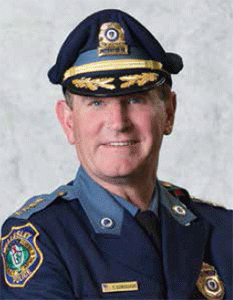
The horrific incidents that have taken place this past year in France, Egypt, Lebanon, the United States, Kenya, Nigeria, and other countries throughout the world demonstrate that violent extremism of all types is a growing global reality. Communities of all sizes are dealing with groups that proffer violent interpretations of their beliefs, radicals hoping to identify and groom new recruits, and individuals who radicalize to violence. Because of this new reality, it is more important than ever before that law enforcement leaders are given the tools they need to incorporate successful strategies to counter violent extremism (CVE).
The IACP has worked hard to provide support to agencies and leaders, beginning in 2008 with the release of a model policy and accompanying paper, providing officers with protocols when dealing with reports or confirmation of suicide bombers.
In 2009, the IACP received a Federal Emergency Management Agency (FEMA) grant. This Suspicious Activity Reporting Grant resulted in a published report highlighting key research findings on the reporting of suspicious activities by citizens, along with an accompanying guide for law enforcement and community partners. In addition, we held a series of roundtables around the United States that resulted in Building Communities of Trust: A Guidance for Community Leaders. This resource, available online, assists community leaders working with law enforcement agencies to facilitate dialogue and work together to prevent crime and terrorism. The strategies complement national strategic goals to empower local partners to keep communities safe from threats of violent extremism.
Our efforts continued with a project funded by the Office of Community Oriented Policing (COPS). The Role of Community Policing in Homeland Security and Preventing Radicalization to Violence aims to increase the capacity of law enforcement agencies to effectively counter extremist ideologies by educating communities about the use of the Internet and social media to promote radicalization to violence. The resources developed under this project focus on using community policing strategies and partnering with community members to develop problem-solving approaches to identify, prevent, and counter extremist websites and narratives intended to radicalize people in disengaged communities. Resources developed through this project include
- awareness briefs focused on the use of social media: “Facebook and Violent Extremism”; “Homegrown Violent Extremism”; “Online Radicalization to Violent Extremism”; “Online Services and Violent Extremism”; “Twitter and Violent Extremism”; and “YouTube and Violent Extremism”;
- a guide titled Using Community Policing to Counter Violent Extremism: 5 Key Principles for Law Enforcement; and
- roll call videos highlighting successful community and police partnerships engaged in countering violent extremism—communities and police departments covered in these videos include Dearborn, Michigan; Los Angeles, California; Montgomery County, Maryland; and the Twin Cities, Minnesota.
The IACP Committee on Terrorism also released resources to assist state, local, and tribal law enforcement agencies in developing strategies to provide an overview about radicalization, reach out and engage their communities, and highlight different types of terrorists including foreign fighters and lone wolves. These include
- Radicalization 101;
- Community Outreach & Engagement Principles;
- “Foreign Fighters”;
- “Lone Terrorists”;
- A Common Lexicon; and
- Sovereign Citizens.
Resources from the Committee on Terrorism and the COPS Office grant project can be accessed online at www.theIACP.org/CounteringViolentExtremism.
The IACP partnered with FEMA once again in 2013 to develop and deliver training that raises awareness and understanding of violent extremism and promotes and supports community policing, community engagement, and community-based solutions. The training will utilize a combination of online courses to help law enforcement prevent, protect, respond to, and recover from acts of terrorism and violent extremism. We are in the final stages of developing the online training, which consists of several targeted tracks designed for specific types and levels of law enforcement professionals. The IACP joined local, federal, and international leaders—including U.S. President Obama and ministers from other countries—at a White House Summit on CVE in February 2015. Participants discussed steps to develop community-oriented approaches to counter hateful extremist ideologies that radicalize, recruit, or incite to violence.
In July 2015, the IACP and Rutgers University, in collaboration with the Federal Bureau of Investigation, U.S. Department of Justice, held a summit on Developing Community-Based Strategies to Prevent Targeted Violence and Mass Casualty Attacks. Practitioners from various disciplines and locations shared knowledge and developed concrete programmatic guidance and an educational curriculum to enhance the capacity of local authorities to prevent mass casualty attacks through community-based, multi-disciplinary intervention activities.
In October 2015, the IACP received a U.S. State Department grant to provide technical assistance to law enforcement for the management and reintegration of returning foreign terrorist fighters (FTFs). Work on this grant has begun in Sarajevo, Bosnia–Herzegovina, where we will assist law enforcement in developing an innovative program focused on reintegrating FTFs who are not candidates for rule of law prosecution and who are not imprisoned, as well as to counter the impetus to travel to foreign conflict zones in the first place. Through this work, we will enhance the capacity of law enforcement to build trust and legitimacy with affected communities and to maintain open and mutually respectful lines of communication for meaningful dialogue with affected communities regarding police-community problems.
It is our goal that officers and communities around the world will be safe and secure. Through these and future projects, the IACP will continue to provide updated training and resources to assist the field in dealing with this evolving issue. ♦
Please cite as
Terrence M. Cunningham, “IACP’s Efforts to Counter Violent Extremism,” President’s Message, The Police Chief 83 (February 2016): 6.


